
France's presidential election race is closer than expected. Here's what to know
An incumbent president standing for election for only the second time in his life; a candidate twice convicted of inciting racist and religious hatred polling in second place; another hard-right stalwart in third and the long-dominant left of French politics in disarray.
Then Russia invaded Ukraine.
With Europe's eyes fixed firmly on Russian President Vladimir Putin's bloody war, priorities have quickly shifted: Ammunition stockpiles, high stakes diplomacy and even the threat of a nuclear strike have all entered the national debate.
Campaigning has been disrupted by the crisis, and several key candidates have had to backtrack on their past support for Putin.
Burnished by his experience on the world stage, most polling suggests that incumbent President Emmanuel Macron is likely to come out on top.
But with just days to go before the election, his closest rival Marine Le Pen is rising in the polls, suggesting the vote could be more tightly fought than the last time the pair went head-to-head in 2017.
France hasn't reelected a sitting president for 20 years, diplomacy has trumped campaigning in the president's agenda and with the conflict fueling a cost of living crisis, French voters aren't facing the election many expected.
Here's what you need to know.
When is the election, and how does it work?
To elect their new president, French voters will likely head to the polls twice.
The first vote, on Sunday April 10, sets 12 candidates against each other. These candidates qualified for the race by securing endorsements from 500 mayors and/or local councilors from across the country.
If no candidate wins 50% of votes in the first round, the two contenders with the most votes will proceed to a run-off two weeks later, on Sunday April 24.
Of the 12 candidates in the race, IFOP polling suggests that only five have ever garnered more than 10% of voters' support. A second round of voting is almost guaranteed.
This also isn't the only national vote France faces this year -- parliamentary elections will take place in June.
Who's in the race?
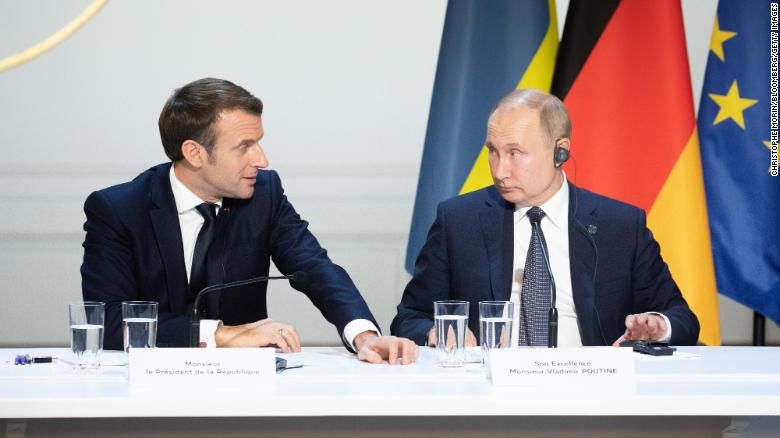
The incumbent
First-term President Emmanuel Macron has only ever stood in one election -- his successful 2017 presidential run -- and has had a mixed record coming into 2022. Considering that no sitting French president has won re-election since Jacques Chirac in 2002, his is a tough spot to be in, though he is the favorite.
An ex-investment banker and alumnus of some of France's most elite schools, Macron stirred up nationwide anger with a diesel tax early in his presidency, setting off the yellow vests movement -- one of the most prolonged protests the country has seen for decades.
"The popularity rating today is important," political commentator Jean-Michel Aphatie told CNN. "The level of hatred towards Emmanuel Macron is considerable and shared."
Internationally, his attempts to win over Donald Trump, prevent the AUKUS submarine deal and his unsuccessful diplomatic efforts to avert war in Ukraine were arguably failures. But Macron's full-throated backing of an ambitious and autonomous European Union has won him respect abroad and established his geopolitical credentials at home.
The most unexpected challenge of his presidency -- Covid-19 -- has perhaps defined his time in office. More than two years of lockdowns and mask mandates, a fumbled EU vaccine rollout and the bold move to effectively force French people to get vaccinated have fired up vocal opposition, even as most of the country learned to live with the realities of the virus and a quiet majority supported the measures.
Macron has refused to debate his opponents and has hardly campaigned himself. While his pole position in the race has never really been under threat, experts believe his strategy has been to avoid the political mudslinging as long as possible in order to brandish his image as the most presidential of all the candidates.
But a week out from the first vote, Macron urged his supporters to guard against complacency. "Anything is possible," he told them, warning of the possibility of a Brexit-style upset in the election.
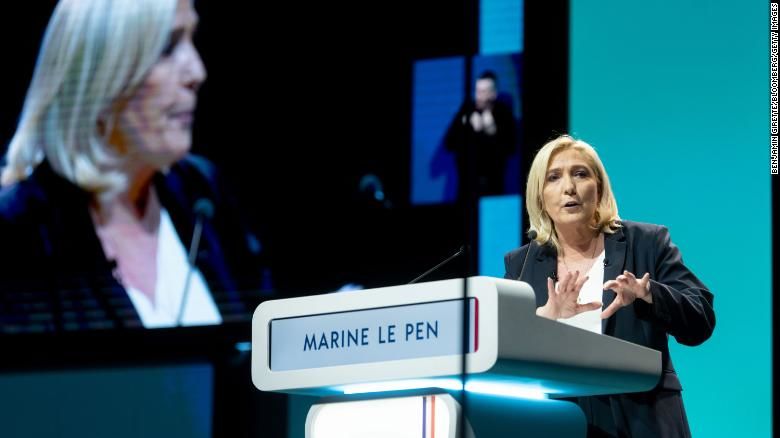
The challenger
"French electoral logic means that in the second round, you have to be the least hated of the two remaining candidates," Etienne Girard, editor of L'Express magazine, told CNN.
While France's first round sees ballots cast across the political spectrum, in the second round many vote to keep a candidate out of office as much as to elect their opponent.
That's been a problem for Marine Le Pen, who has been synonymous with the French far-right for much of the past decade.
Now an MP in the Calais region -- the gateway to the UK that has struggled to deal with migrants heading to Britain -- the anti-immigrant Le Pen faced off against Macron in 2017, but lost by a sizeable margin.
Her father, fellow far-right firebrand Jean-Marie Le Pen, also lost in the second round -- in his case to Chirac in 2002.
Marine Le Pen's strategy for this election was originally one of winning mainstream support -- "a strategy of respectability," as Girard describes it.
While still strongly anti-immigrant, the softening of her tone around flagship topics like Islam and euroskepticism -- especially since Brexit -- has been widely touted as an effort to win over voters outside her far-right base. Even so, "stopping uncontrolled immigration" and "eradicating Islamist ideologies" are her manifesto's top two priorities.
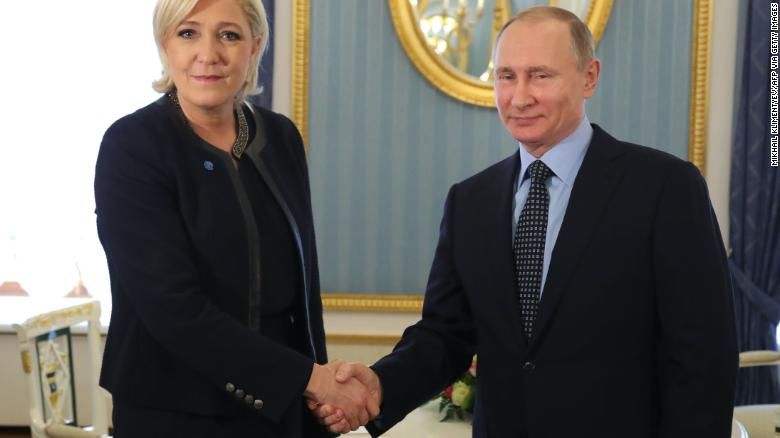
A fan of Vladimir Putin -- a photo of her visiting the Russian president featured on a since-scrapped campaign leaflet -- the war in Ukraine has brought up uncomfortable questions for Le Pen.
But in the campaign's final weeks, she's put the cost of living front and center of her platform, promising measures that she claims will put "150 to 200 euros" back in the pockets of each household, including a pledge to lift sales tax on 100 household goods.
Le Pen is known for capturing hard-to-reach voters, according to pollster Emmanuel Riviere. "She always manages to seduce people who are not interested in politics at all, precisely because she offers them a solution to express their anger towards politics," he told CNN.
Le Pen is currently polling far higher than she did at the 2017 election. Days out from the first round, IFOP polling suggests she may win 47% of votes in a second round runoff against Macron.
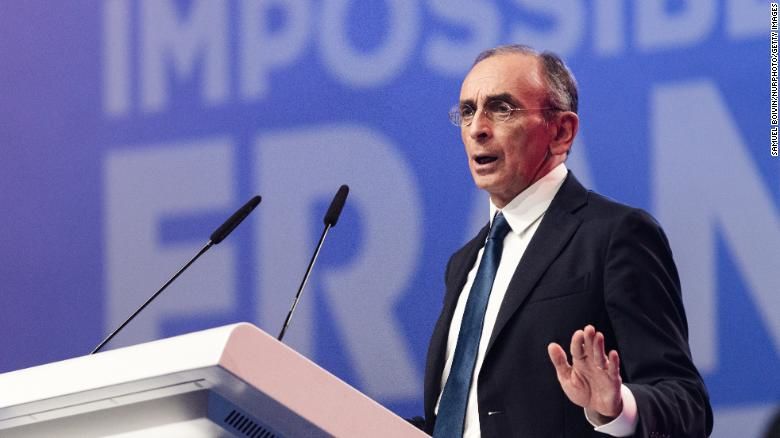
New extremes
The new kid on the block, far-right TV pundit and author Eric Zemmour had long been touted as a possible presidential contender. Known for his uncompromising stances on Islam, children with non-French names and immigration, he has twice been convicted for inciting racial or religious hatred.
As a presidential candidate, he has doubled down on his race-driven rhetoric, touting the racist "Great Replacement" conspiracy theory in his speeches and promising a "ministry for re-immigration" to deport as many as 1 million people of North African descent from France. The theory contends that immigrants want to "replace" the native-born French population.
Zemmour enjoyed a seat among the top three candidates until March, according to IFOP polling, challenging the Le Pen family's dominance of the political far-right.
He openly cites Islam as a danger menacing France and has attracted a more educated and affluent demographic to the political extreme, according to Riviere. Well-read and a talented orator, his appeal to "save our homeland, our civilization, our culture" has struck a chord with some.
"People, when they sit in front of their TVs and listen to him, they feel like they're being elevated. And that, in France, is something that is expected enormously from a political leader," said Girard, who has also written a biography of Zemmour.
Ultimately, though, he is treading on the toes of Le Pen.
"They are really in direct competition with each other because their confrontation can make them lose big to one or the other," Riviere said.
Zemmour -- who in 2018 proudly confessed to "dreaming" of a French Putin -- has seen his popularity wane since the war in Ukraine began.
Zemmour was publicly convinced that Putin would never invade, then continued to defend him even after he did. Zemmour has since condemned the invasion -- something of a U-turn in his support for the Russian president.
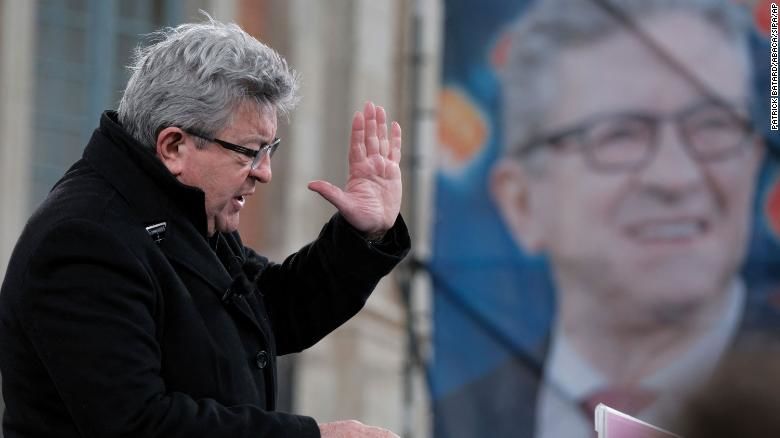
Outside chances
In Jean-Luc Melenchon, the French far-left has its firebrand politician too. The leader of the "France Unbowed" party, veteran activist and politician Melenchon has stood in three presidential contests so far.
Among his flagship policies are a "fiscal revolution," a radical rethinking of French governance towards more direct involvement of the electorate and a 1 billion-euro plan to combat violence against women -- a hot-button issue in France.
But devoid of a unifying candidate, the French left seems to have little chance of challenging for a second-round place. Melenchon has a loyal base among voters from the far-left but he's struggled to win over more centrist voters.
Both Anne Hidalgo, Mayor of Paris and the left-wing Socialist Party's presidential candidate, and Valerie Pecresse, of the right-wing Republicans party, have struggled to make headway in the polls -- a damning indictment of the French political mainstream. Their parties suffered from the creation of Macron's centrist "La Republique En Marche" party in 2016, and have yet to recover.
But while Macron may be in the lead as French voters prepare to go to the polls, April may yet have surprises in store.
"In this country, anything is possible. We've seen the impossible come true in other countries," political commentator Aphatie said. "Donald Trump elected? Never."
What do the polls say?
Incumbent Macron is out in front, according to polling from IFOP, which suggests his levels of support haven't dropped below 24% since January, and rose to a high of 31% in the first weeks of the war in Ukraine.
Similarly, Marine Le Pen has held on to second place for almost all of the past three months -- hitting a high of 21% at the end of March -- according to IFOP.
All of which would seem to set up a rerun of the 2017 second round. But while Macron walked away with almost two-thirds of the votes last time around, IFOP polling suggests that this year a Macron-Le Pen faceoff could result in the incumbent taking 53% of the vote to 47% for Le Pen, a much less comfortable margin of victory for Macron.
What are the biggest issues for French voters?
The cost of living is among the top issues for the French electorate this year. Faced with the economic fallout of the pandemic, high energy prices and the war in Ukraine, voters are feeling the pinch, despite generous government support.
While financial pressures may not be enough to whitewash some candidates' extremism in voters' minds, they may push some to look for unorthodox answers to their problems.
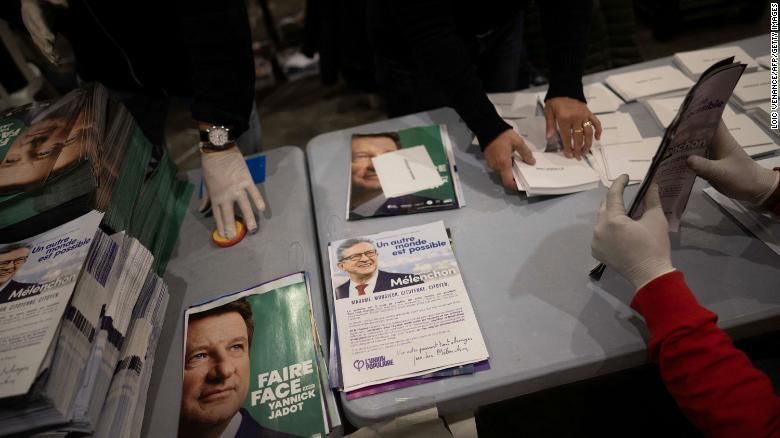
The fighting in Ukraine is a long way from the bistros and cafes of France, but the conflict is certainly on voters' minds. Just shy of 90% of French people were worried about the war in the last week of March, according to IFOP. Given the challengers' patchy record on standing up to Putin, this is likely to play in Macron's favor.
Notably absent from the debate has been the environmental crisis. Although the importance of climate protections is gaining traction globally, France sourced 75% of its electricity needs in 2020 from nuclear energy, according to the French environment ministry. With most candidates backing the kind of nuclear development that Macron has already announced, there is little divergence on this issue.
For all the fanfare that this election once promised, with a war on the European Union's border and many voters struggling to pay their bills, France's choice may now rest more on the next five months than the next five years.










